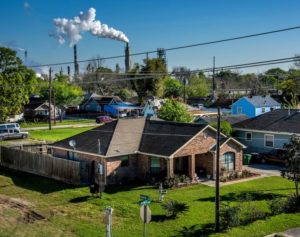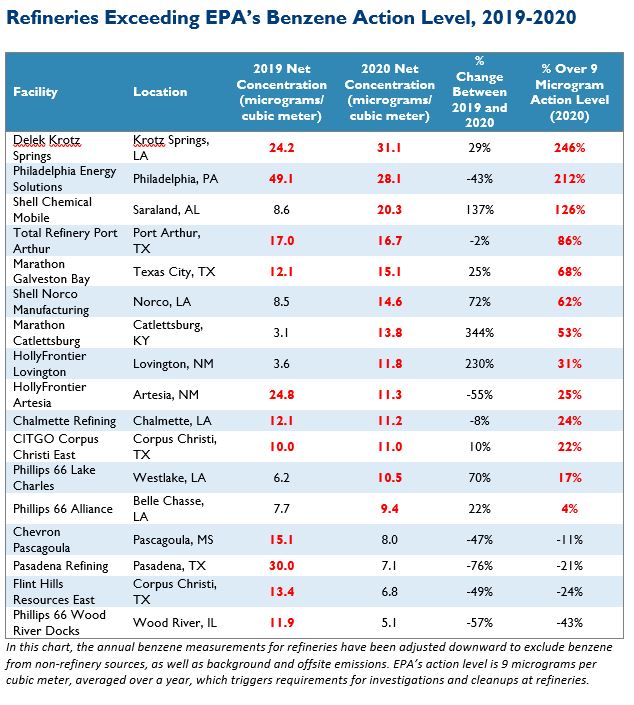
Fenceline Monitoring at Refineries in LA, TX, PA, NM, AL and KY Revealed Pollution Threatening Minority and Lower-Income Communities
For a copy of the report, click here.
To listen to audio of the press conference, click here.
Washington, D.C. – Cancer-causing benzene from oil refineries escaping into mostly minority and lower income neighborhoods exceeded the federal action level for 13 refineries across the U.S. in 2020, according to data from the U.S. Environmental Protection Agency.
That meant more communities downwind from refineries in Louisiana, Texas, New Mexico, Pennsylvania, Alabama, and Kentucky were at risk from this deadly carcinogen in 2020 than the previous year, when 11 refineries were over the action level in the first year that EPA fenceline benzene monitoring data were publicly available.
More than 530,000 people live within three miles of the 13 refineries in 2020, with 57 percent being people of color and 43 percent living below the poverty line, according to a report by the Environmental Integrity Project, “Environmental Justice and Refinery Pollution.” The benzene figures for these refineries excluded emissions from offsite sources.
“If the Biden Administration wants to make good on its promise to tackle environmental injustices, it should act immediately to crack down on these dangerous benzene emissions,” said Eric Schaeffer, Executive Director of the Environmental Integrity Project (EIP).
A 2015 Clean Air Act rule requires refineries to investigate and clean up benzene emission sources whenever fenceline monitors show that the annual concentrations of this cancer-causing pollutant exceed EPA’s action level of 9 micrograms a year (excluding any contribution from offsite or non-refinery sources).
“EPA needs to start responding more rapidly to short-term spikes in benzene that threaten public health,” said Schaeffer, former Director of Civil Enforcement at EPA. “And the agency should tighten up its regulations to close a loophole that allows refineries to avoid counting emissions from benzene storage tanks and other non-refining equipment – even though neighbors are exposed to all of these toxic emissions.”

EIP’s report explains that fenceline monitoring data show that actual benzene emissions from oil refineries across the U.S. are higher than they appear. This is because the EPA’s 2015 regulations, which the agency imposed in response to a lawsuit that EIP and Earthjustice filed on behalf of communities living downwind from refineries, include a loophole. This loophole allows refiners to subtract from the benzene concentrations measured by fenceline air pollution monitors any benzene thought to come from offsite or non-refining equipment (such as benzene storage tanks).
If the total benzene concentrations are taken into account (without these adjustments), 17 refineries across the U.S. – not just 13 – would have averaged more than EPA’s “action level” of 9 micrograms per cubic meter in 2020. Nearly 700,000 people live within three miles of these 17 plants, with people of color accounting for 62 percent of this total, and nearly 45 percent living below the poverty level.
“These findings confirm what many fenceline communities have been aware of for decades: Fossil fuel refineries are as dangerous to public health as they are to the global climate,” said Corey Williams, Research and Policy Director for Air Alliance Houston. “These communities – predominantly working-class people of color – face a disproportionate health and safety burden, and not just from one pollutant – benzene – but from a diverse cocktail of toxic chemicals.”
EIP’s report also shows that because EPA’s benzene regulations are based on annual averages, they often fail to reveal — or protect local residents against — dangerous short-term spikes in air pollution. These spikes, above health advisory levels set by the federal Agency for Toxic Substances and Disease Registry (ATSDR), happened at 23 oil refineries in 2020. Two examples are listed below:
- The Valero Corpus Christi East refinery on the Texas’ Gulf Coast reported 386 micrograms of benzene per cubic meter of air along its fencelines for the two weeks ending on May 27, 2020. That concentration was so high, it exceeded federal safety standards recommending respirators for workers exposed to this much for an eight-hour day. Over an entire year, air monitors along the plant’s fencelines recorded an average of 26 micrograms of benzene per cubic meter in 2020. That was almost three times EPA’s action level, which would normally have required an investigation and cleanup. However, in the company’s reporting to EPA, Valero adjusted its benzene numbers downward to subtract what it called offsite sources of benzene. The result was an annual average of only 4 micrograms per cubic meter, which was so low the company was required to perform no cleanup.
- The Chevron refinery in Pasadena, east of Houston, recorded short-term benzene spikes of 565 micrograms per cubic meter for the two-week period ending on October 30, 2019, and 33 micrograms for the two-week period ending April 1, 2020. Both were far higher than the ATSDR’s “minimal risk level” of 29 micrograms[i] per cubic meter for short-term exposures of up to two weeks. The October 2019 numbers at the plant’s fencelines were so high over two weeks, they even exceeded federal worker safety advisories recommending respirators for people breathing more than 319 micrograms per cubic meter over an 8-hour workday.
Air pollution from several oil refineries got significantly worse during the final year of the Trump Administration, according to EPA data compiled in EIP’s report. Here is a breakdown of the worst cases, by state, using EPA’s adjusted annual averages:
Louisiana had five refineries with benzene over the EPA action level in 2020. The highest annual averages in the nation were at the Delek corporation oil refinery in Krotz Springs, Louisiana, about 40 minutes west of Baton Rouge, where fenceline benzene readings worsened by 29 percent between 2019 and 2020 and averaged more than triple EPA’s action level last year. There were also exceedances at the Shell Norco refinery outside New Orleans, Chalmette Refining, and the Phillips 66 refineries in Westlake and Belle Chasse.
Texas had three refineries with benzene over the action level in 2020. At the Marathon Galveston Bay refinery, in Texas City, about 40 miles southeast of Houston, benzene levels got 26 percent worse between 2019 and 2020 and were 68 percent above EPA’s action level in 2020. Also over the limit were the Total Refinery Port in Port Arthur and CITGO Corpus Christi East.
New Mexico had two refineries over the action level in 2020. At the HollyFrontier refinery in Lovington, southeast of Albuquerque, benzene readings soared 150 percent between 2019 and 2020, and were 11 percent above EPA’s guidelines last year. The HollyFrontier refinery in Artesia, NM, saw its fenceline levels of benzene decline 55 percent last year, but they still averaged 25 percent over EPA guidelines in 2020.
Alabama: The Shell Chemical Mobile refinery, just north of Mobile, Alabama, had annual benzene readings soared to more than twice the federal guidelines in 2020. The fenceline readings at the plant became 137 percent worse between 2019 and 2020.
Kentucky: At the Marathon Catlettsburg refinery in Catlettsburg, east of Lexington, benzene readings at the fenceline jumped 233 percent between 2019 and 2020, and were 11 percent above the EPA action level last year.
Pennsylvania: The benzene readings at the fenceline of the Philadelphia Energy Solutions refinery in South Philadelphia actually fell by 43 percent between 2019 and 2020. But they remained more than triple the EPA action level in 2020, which is extraordinarily high for a refinery that closed in June 2019 after a fire and explosion.
QUOTES FROM LOCAL GROUPS:
Anne Rolfes, Director, of the Louisiana Bucket Brigade, said: “Benzene is not some harmless chemical – it is a known carcinogen. We want the new administration at EPA to acknowledge that the Louisiana Department of Environmental Quality is incapable of solving this problem. Year after year, the state has failed to act. We need federal intervention and we need it now. Without an active EPA, schoolchildren will continue to be exposed. It is so wrong.”
John Beard, Founder and Chairman of the Port Arthur Community Action Network, said: “This report is troubling, and given that our city has twice the state and national average for cancer and respiratory diseases, serious enforcement action must be taken. Such gross cancer-causing violations are unacceptable. The refineries must take cleanup actions now, and invest more to improve the health and lives of our residents.”
Rev. Adam T Carrington, Senior Pastor at the Brooks A.M.E. Church in Corpus Christi, said: “While America is focusing on the Covid-19 pandemic, not addressing the pandemic of air pollution containing cancer causing chemicals like benzene spewed by refineries is a huge mistake. Exposure to Benzene is potentially life threatening for all Americans especially for those of us who live in Corpus Christi Texas.”
Cade Kistler, program director for Mobile (Alabama) Baykeeper: “Federally required monitoring found Benzene levels outside the Shell Chemical refinery in Saraland, Alabama, are more than double the acceptable level set by the EPA. Clean air is critical for the health of our communities. As required by the federal rules, EPA must ensure Shell investigates high levels of Benzene and stops the pollution to protect air quality for the communities who live in the area.”
Robin Blakeman, organizer for the Ohio Valley Environmental Coalition, said: “The Marathon Refinery in Catlettsburg, Kentucky, has been a major polluter in the Tri-State area for decades. This report shows clearly how significant that pollution is. The fact that this level of pollution is affecting nearly 12,000 people within a three mile area should give public health authorities a reason for high levels of concern. Unfortunately, due to high poverty levels in this area, the health risks of toxic chemicals like benzene are often ignored. Once again, Appalachian communities are considered acceptable sacrifice zones.”
Rebecca Sobel, Organizing Director of WildEarth Guardians in New Mexico, said: “These latest reports of dangerous, cancer-causing benzene releases from New Mexico oil refineries underscores the terrible toll that the oil and gas industry is taking on communities,” said. “Worse, this toxic pollution is disproportionately impacting people of color, perpetuating a major environmental injustice that must be confronted.”
For a copy of the report, click here.
Citizens concerned about benzene emissions from oil refineries should contact the Office of EPA Administrator Michael Regan through this link or their local Congressional representative in the U.S. House here or the Senate here.
The Environmental Integrity Project is a 19-year-old nonprofit organization, based in Washington DC and Austin, Texas, that is dedicated to enforcing environmental laws and strengthening policy to protect public health and the environment.
The Louisiana Bucket Brigade uses grassroots action to create an informed, healthy society that holds the petrochemical industry and government accountable for the true costs of pollution to hasten the transition from fossil fuels.
Air Alliance Houston is a non-profit advocacy organization working to reduce the public health impacts of air pollution and advance environmental justice.
The Ohio Valley Environmental Coalition is a grassroots organization working for the improvement and preservation of the environment and communities throughout the Ohio River Valley.
Mobile Baykeeper has served the Mobile Bay area in Alabama for more than 20 years. Our mission is to provide citizens a means to protect the beauty, health, and heritage of the Mobile Bay Watershed and our coastal communities.
Media contacts:
Tom Pelton, Environmental Integrity Project, (443) 510-2574 or tpelton@environmentalintegrity.org;
Anne Rolfes, Louisiana Bucket Brigade, (504) 484-3433 or anne@labucketbrigade.org
Riikka Pohjankoski, Air Alliance Houston, (713) 528-3779 or riikka@airalliancehouston.org


